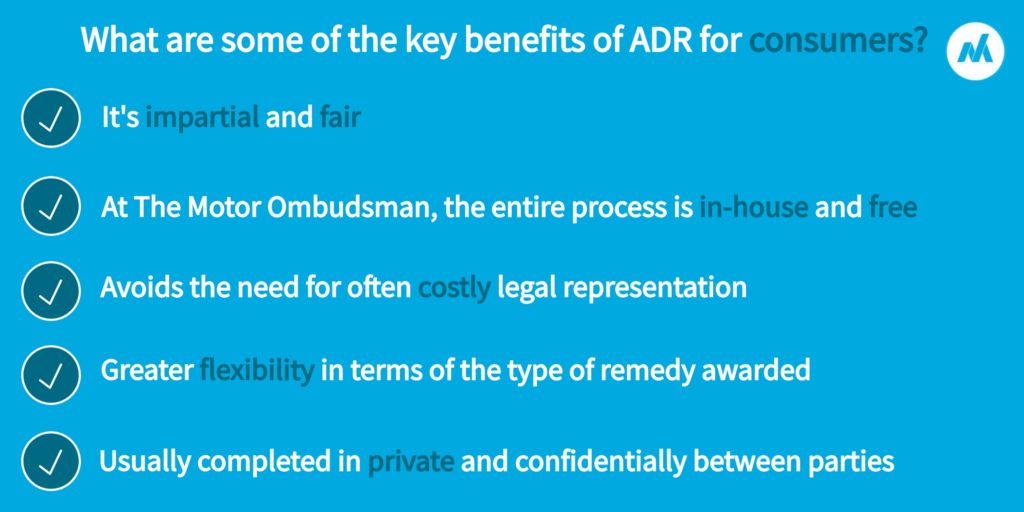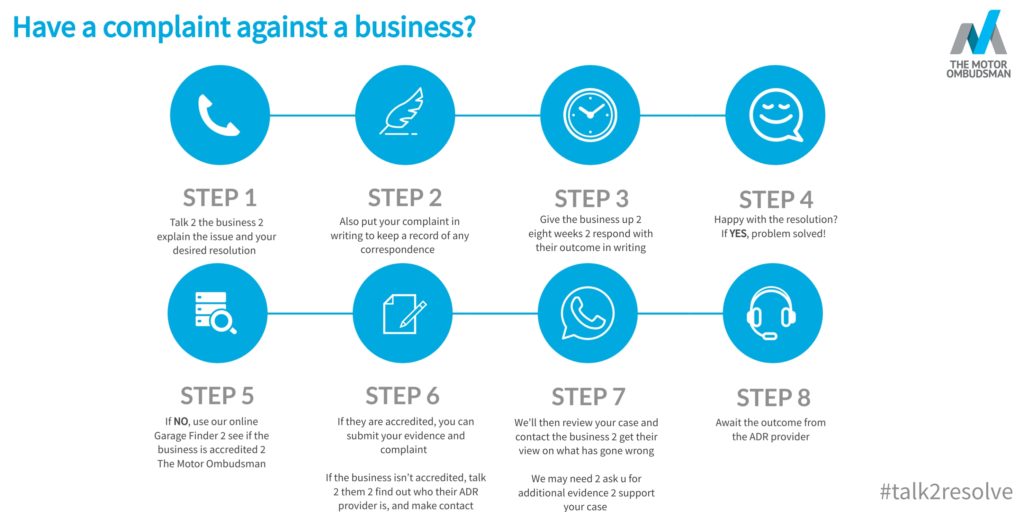Dispute Resolution (10 Articles)
Back to Knowledge HubHow long will it take to get a resolution to my case?
How long it takes will depend on the nature and complexity of your complaint.
It could take longer if things are more complicated, or if you or the accredited business wants an ombudsman to make a final decision. If there is something which means the situation is more urgent, then please let us know and we will take those circumstances into consideration.
You retain the right to withdraw from our proceedings at any stage. However, if you do accept a final decision, it will become legally binding on both parties and you may lose your right to take the complaint elsewhere.
How will my dispute be reviewed and managed by The Motor Ombudsman?
Once we’ve got your details, one of our team members will review your complaint and decide the best way to try and resolve it. This could be through early resolution or mediation, where we look to find an amicable and practical solution to the problem. If this isn’t possible, one of our legally-trained adjudicators will:
- Review the evidence provided by both you and the accredited business;
- Find out the facts and weigh everything up; and
- Tell you and the business what they think
If we think there’s just been a misunderstanding, we’ll explain why. There may also be times where the offer already made is considered reasonable in the circumstances, or there just isn’t enough information for us to be able to make a fair decision.
If we decide you’ve been treated unfairly, or that something has gone wrong, we’ll tell the business to put things right. Any award we make will be to put you back in the position you would have been in had the problem not happened.
You don’t have to agree with what we say – at any point, you can let us know that you no longer want our help.
What happens if the business that I have a dispute with is not accredited to The Motor Ombudsman?
Accreditation to The Motor Ombudsman is voluntary, and whilst we are continually looking to increase the level of coverage provided by our Codes of Practice, there may be the possibility that a business that you have a dispute with, is not part of The Motor Ombudsman.
If this is the case, it’s worth asking the business if they are signed up to another Alternative Dispute Resolution (ADR) provider to help resolve your dispute. According to the Alternative Dispute Regulations introduced in 2015, a business, such as a garage or dealership, must signpost you to an ADR provider, and tell you if they will engage with them.
If the business does not use an ADR provider, such as The Motor Ombudsman, then you can complete our online form (at the bottom of this page) to provide information about the business and your dispute.
If the complaint falls within our remit, some helpful information and guidance will be sent to you by e-mail, which may help to encourage the business to become accredited to us and allow us to deal with your dispute.
If a business chooses not to become accredited to The Motor Ombudsman, we can point you in the direction of Citizens Advice, who may be able to assist you further.
How do I find out whether an independent garage or franchised dealership is accredited to The Motor Ombudsman?
You can find this out by entering your postcode or the name of the business into our online Garage Finder.
You can also check which manufacturers and vehicle warranty product providers are accredited by taking a look at the relevant Code of Practice page on our website. Click here for the New Car Code and here for the Vehicle Warranty Products Code.
How do I know whether The Motor Ombudsman can deal with my dispute?
We are able to help resolve your dispute, if:
You made a purchase from a business that is accredited to us.
AND
You have been through the accredited business’ in-house complaints handling procedure.
We cannot start to investigate your complaint until you and the accredited business have had a proper chance to try and resolve the problem yourselves. This means that you must have made a complaint to the accredited business, preferably in writing, and have given them up to eight weeks to provide their final answer to your complaint in writing before approaching us. Please note that you can ask us to investigate further as soon as you receive a final response from the accredited business.
AND
Your purchase was made within the last six years.
What are the key benefits of using ADR to resolve my complaint?

- ADR is a fair and impartial process, and helps to avoid confrontation and safeguard the relationship and trust, between yourself as the consumer, and the business that you have a complaint against
- In the case of The Motor Ombudsman, the entire ADR process is in-house and free of charge for you from start to finish, meaning that you can save money and stress compared to when pursuing a business through the legal system (i.e. going to court)
- ADR procedures can often be more flexible in terms of their outcome. It may therefore be possible to achieve outcomes that a court could not award, or to get a result that the parties think is fairer than that dictated by law
- The resolution of the dispute may be concluded confidentially behind closed doors, as opposed to the case being brought to a more public environment like a courtroom or being resolved across social media
When can I use an ADR provider to help resolve my complaint?
It’s always best to try and resolve any complaints directly with the business and keep the channels of communication open to achieve this. However, if this is not possible, and you have given the business up to eight weeks to provide their final response, you can then get in touch with an ADR provider, such as The Motor Ombudsman. The business should provide their details in the final response, and it’s best to ask for this to be in writing.

How do I know whether a business has appointed The Motor Ombudsman as its ADR provider?
Any business accredited to one or more of our four Motor Industry Codes of Practice should either have information about their accreditation on display at their premises, where that’s possible, or be available on their website. On some occasions, a digital ‘Smart Badge’ on the business’ website will show the status of their accreditation to The Motor Ombudsman (i.e. whether it’s active or not). Similarly, all businesses listed on our website, such as vehicle manufacturers, and vehicle warranty product providers, and on our online Garage Finder will be accredited to us.
You can also ask for the complaints policy of the business, as this should include details of their appointed ADR provider, such as The Motor Ombudsman, and similarly, this information should be made available when you receive a final response to your complaint.
However, it’s important to note that the current ADR Regulations only require a business to direct consumers to their preferred ADR provider; they don’t have to use one to help resolve the dispute. A benefit of using a business that’s accredited to The Motor Ombudsman, is that they have agreed to participate in our dispute resolution process in the event of a complaint.
If a business, such as an independent garage or car dealership, has not appointed an ADR provider, we recommend that you contact Citizens Advice for guidance on how to progress your dispute.
What legislation oversees Alternative Dispute Resolution (ADR)?
The Alternative Dispute Resolution for Consumer Disputes (Competent Authorities and Information) Regulations 2015 and The Alternative Dispute Resolution for Consumer Disputes (Amendment) Regulations 2015, better known as the Alternative Dispute Resolution Regulations 2015, govern the ADR process in the UK. The legislation came into force on 9th July 2015 following the implementation of a 2013 European Directive on ADR.
From 1st October 2015, businesses have been required to supply consumers with the details of a certified ADR provider, and inform them as to whether they intend to use them to help resolve a dispute.
Businesses should actively sign up to be part of an ADR body, such as The Motor Ombudsman, as this demonstrates to consumers that they are acting both transparently and fairly.
What is Alternative Dispute Resolution (ADR)?
Alternative Dispute Resolution (ADR) is a method of resolving a dispute fairly between consumers and businesses without having to go through the legal process, often making it quicker, cheaper and simpler than going to court. ADR is governed in the UK by a set of regulations which came into force on 1 October 2015.
At The Motor Ombudsman, we want to resolve every complaint as quickly and as amicably as possible, so we will always look to see if it’s possible to resolve the issue without the need for the case to be passed on to an adjudicator. This may be through early resolution, for example when the business makes an offer to settle the dispute, or through mediation.
If, however, we can’t resolve a complaint this way, we use the process of adjudication, which is where an impartial adjudicator reaches a decision (i.e. in favour of the consumer or business or even a split outcome in some circumstances), by evaluating the evidence supplied by both parties against the standards set by our Code of Practice and, where relevant, the law.